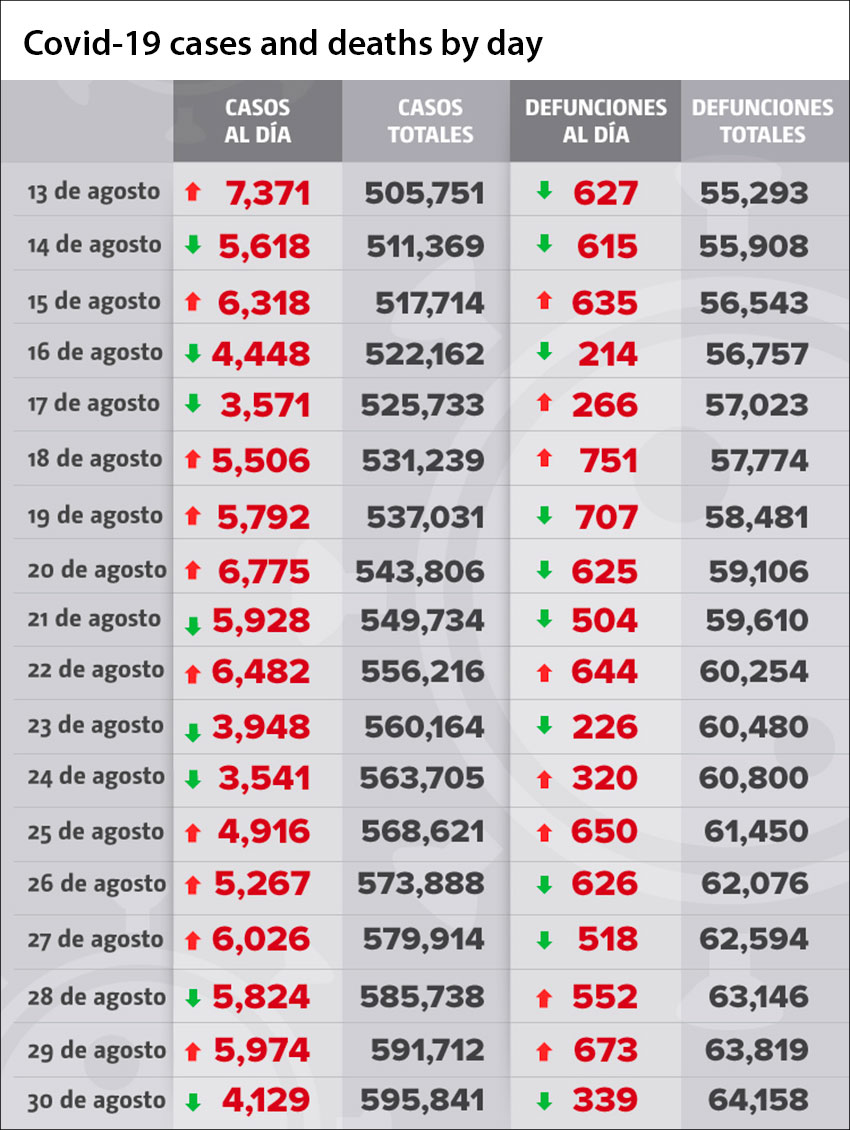New coronavirus case numbers have declined in recent weeks but there is no guarantee that the trend will continue, Deputy Health Minister Hugo López-Gatell said Sunday.
Health Ministry data shows that estimated new case numbers declined 12% between epidemiological weeks 33 – August 9 to 15 – and 34. The decrease in new case numbers continued a downward trend that began in mid-July.
But López-Gatell, who leads the government’s pandemic response, explained that the Health Ministry is still registering data for week 34 – August 16 to 22 – and as a result the 12% decline might not be sustained.
“We can’t guarantee that this [reduction] will be maintained,” he said, adding that it is possible that new case numbers actually remained stable between weeks 33 and 34.
“Maybe we’ll end up again in a plateau stage. Remember that we’ve explained over and over again that the epidemic doesn’t decline in a monotonic way, … with a continuous decrease in other words. Rather, [the decline] has moments of stagnation,” López-Gatell said.

Total confirmed cases in Mexico increased to 595,841 on Sunday with 4,129 new cases registered. The Health Ministry estimates that there are 41,959 active cases across the country.
Mexico City has the highest number of estimated active cases, with 7,613, followed by México state, where 3,567 people currently have symptoms of Covid-19, according to health authorities. Two other states, Nuevo León and Guanajuato, are estimated to have more than 3,000 active cases.
Mexico’s official Covid-19 death toll increased to 64,158 on Sunday with an additional 339 fatalities registered. López-Gatell said that deaths decreased 56% between epidemiological weeks 33 and 34.
However, as the Health Ministry is still registering data for the latter week, it is improbable that such a large decline will be maintained.
Mexico City has the highest Covid-19 death toll in the country with 10,508 people confirmed to have lost their lives to the disease.
México state ranks second for total deaths with 8,002 followed by Veracruz, Puebla and Baja California, each of which has recorded more than 3,000 Covid-19 fatalities.
López-Gatell reported that 1.34 million people have now been tested for Covid-19 and that the positivity rate – the percentage of tests that come back positive – is 43%.
The rate is very high because the vast majority of testing is carried out on people who arrived at health care facilities with serious coronavirus-like symptoms.
López-Gatell also reported that 35% of general care hospital beds set aside for coronavirus patients are currently occupied while 30% of those with ventilators are in use.
Nuevo León has the highest occupancy rate for general care beds, at 63%, followed by Nayarit and Hidalgo, where 52% and 50%, respectively, of such beds are in use.
Nuevo León also has the highest occupancy rate for beds with ventilators, at 56% followed by Aguascalientes and Colima, where 51% and 50%, respectively, of critical care beds are in use.
Source: El Universal (sp)
